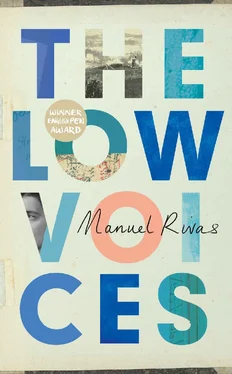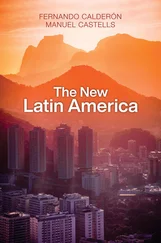
Castro de Elviña women
We’d had to leave Marola Street in a hurry, a rapid evacuation. The owners wanted the ground floor for something else and gave us no notice. I remember my mother went to discuss a moratorium with them. She took me along with her. She was very calm, but that day I could feel her racing pulse in her hand. We were received in the hallway by the wife. She was a stiff, bejewelled kind of woman. My mother said something similar to Rosalía de Castro’s poem ‘Justice by the Hand’. The woman called out for her husband. We were surprised to see a little man in an apron. The woman tried to incite him against my mother, but he quivered and spoke in a whisper. It wasn’t clear who or what he was more afraid of — the irate tenant or his wife’s commands. In the end, Carme stared at this stuttering figure, took me by the hand, and we left without another word. On the way back, she kept talking to herself. All I could feel now on the palm of my mother’s hand was the fuming of her sirvente .
While my father got going with the work on the house, on that patch of hillside he’d bought with the help of his Venezuelan bolivars, we stayed for several months with my paternal grandparents, the carpenter and the seamstress. They also lived on a mountain, next to O Birloque and A Cabana, in O Martinete, a place of which almost no trace is left. My grandfather worked away from home, but had a workshop on the ground floor of the house and, on Sundays, would cultivate a field next to the Monelos river, which flowed through the fertile land of A Granxa and into the port of A Coruña. Back then, the river was still alive. If eels swam up it, it was because they remembered the thousands of years the little Monelos had meandered through Os Sargazos. Since then, the river has also disappeared and been buried. It crosses the city in a pipe and merges with the sea without anybody noticing. Sometimes, during a downpour, you can hear the mutter, the roar, of the river’s ghost in an underground garage.
One of those who lived in O Martinete was a mute man with a long beard. I think his name was Fidel, or that was what they called him, possibly with reference to the Cuban revolution. He was a good friend of my grandfather the carpenter. The two of them got on very well in silence. Fidel the sawmill operator always wore blue overalls and really did resemble a legendary hero. He had the air of an Argonaut who’d lost the power of speech on an island where words are stolen. He was both thickset and nimble, and put all his body into making signs whenever he wanted to convey something. Needless to say, he was the most communicative neighbour for miles around. My grandfather would listen with his eyes and then become thoughtful or nod. They could be like this for hours. He was a whole, philosophising anatomy, exclaiming with his eyelids, emphasising with his eyebrows and writing in the air with his arms or hands, his fingers composing ideograms. One day, the fountain stopped working. No water emerged from the spout. The mute, who understood all about machinery, started to explain the problem to the huddle of neighbours. He didn’t use words but, judging by the attention they paid, you could see the extraordinary eloquence, the energy, of his talking body. The way he drew the water’s path in the air. The law of communicating vessels. When he’d finished, the water started flowing out of the spout. It couldn’t do otherwise. Nobody needed any more convincing. It would have been a shame for the water not to emerge.
And then the day of the great snowfall arrived. The day for carrying the door. For having our own home.
This is the area where the University of A Coruña now stands. It should really be called the University of Castro de Elviña. That was one of the first things they taught me. Castro was one thing, A Coruña another. In this area, where everybody hankers after the city’s coat of arms, Castro is the only place known to have defended its position as a village. This is what happened when the first neighbourhood association was constituted. The meeting took place in Leonor’s pub. The governor, at a time when governors were like a panoptic eye that watched over everything, dispatched a plain-clothes policeman. He didn’t need to introduce himself. He was the only one dressed in a suit and tie. The secret man took a seat and started noting down everything that was said. At one point, however, he stopped writing, and that was when the assembly unanimously agreed to remain as a ‘village’, rejecting the term ‘city district’. A woman, who warned she’d left a saucepan on the stove, then intervened to protest against a tax for the cleaning of chimneys. Had anybody ever laid eyes on this municipal chimney sweep? Might the long-awaited, real chimney sweep not be that man, the one taking notes? The civil servant was nonplussed. He grabbed his notes and scurried away like a nervous, frustrated detective afraid of a place that is not so much dangerous as imaginary.
We realised we’d reached a breeding ground on land as soon as we arrived. We were about to put down roots in a territory that seemed hostile. Dogs ran free and snapped at our outsider heels. María and I didn’t dare set foot outside the precinct. The only thing that calmed us down that night was spotting the beam of the lighthouse. It was further away now, but this meant you could see it better. Its circular glow penetrated the dusk and entered through our window. When we woke up and went outside, we saw the whole mountain had been painted in colours. The washerwomen had spread out their clothes. And the Barreiro girls, Pepe and Maruxa’s daughters, were atop the Cuckoo’s Crag. Among other things, we learned that carnival was coming. And on Shrove Tuesday, at the football stadium, something would happen that had never happened before.
‘What’s that?’
‘There’ll be women playing!’ said Beatriz.
If women were playing football, then clearly we weren’t in the back of beyond. It was true the wind turned around here. How could it not? It was at the service of the washerwomen.
I SAW HIM dig two wells. He probably dug others. Real wells, artesian wells, for the supply of water. Even though this wasn’t his job. On the contrary. My father’s work as a builder was more closely linked with height than depth. But when it was necessary, he would open a hole in the ground. And start building downwards.
He worked for a long time with Xosé, a younger man who called him ‘master’. Xosé of Vilamouro was very serious, very quiet, and while he worked only ever expressed himself with deep onomatopoeias and the experimental music of tools in action. I was struck by the way he addressed my father as ‘master’ and did it so naturally. This meant there was a master doing the same job, which implied not a hierarchy, but respect. In this case, the master was my father. There are words that fill the look. I could argue with my father, be in disagreement, get annoyed, but, whenever he was working, I couldn’t help viewing him as a master. The builder’s silence, like that of other trades, has to do with the need to hear the sound of his work. The sound produced by the tools entering into contact with the material. A lack of harmony reveals a fault in the symmetry. You have to hear the trowel or the ruler when you plaster a wall. But, on animated occasions, the opposite process can take place. Now Xosé and my father are humming, whistling, trumpet and sax, in comes the trombone, the music affects the tools, filling them with a desire for style. Perhaps in this as well, my father, who learned music theory before his ABC, is playing the role of master. When something in the material rebels, when the mass disobeys, he falls silent. Looks around, examines the disharmony. Checks the mixture. Proceeds over the fault. Doesn’t swear or curse. I know what he’s going to say …
Читать дальше













